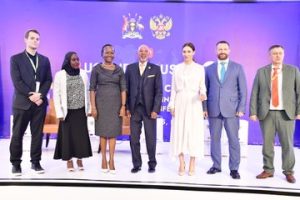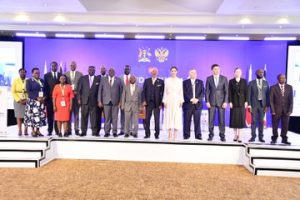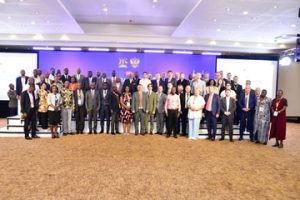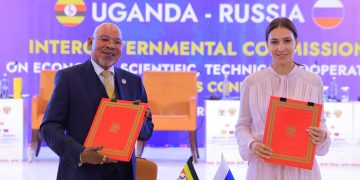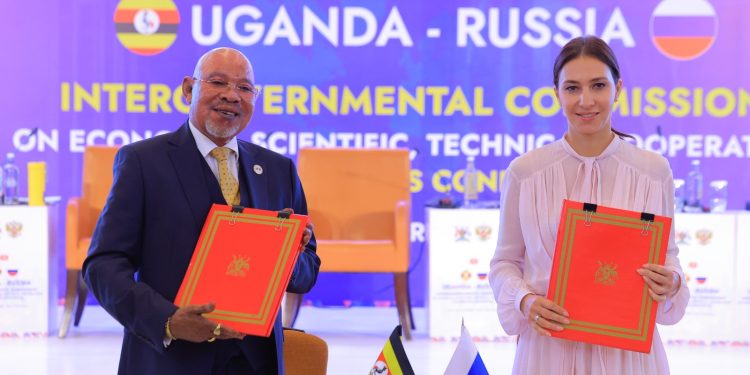Munyonyo — Uganda and Russia have reaffirmed their commitment to deepen economic, scientific, and technical cooperation as the Ministerial Segment of the Third Uganda–Russia Intergovernmental Commission (IGC) officially opened at Speke Resort Munyonyo.
Opening the session, Hon. Gen. Jeje Odongo, Uganda’s Minister of Foreign Affairs, underscored the importance of strategic collaboration in energy, ICT, artificial intelligence, infrastructure, agro-industrialisation, and scientific research, describing them as pivotal sectors to accelerate Uganda’s transition into a modern, industrial, and knowledge-based economy.
“Our two countries share a long history of loyal friendship built on mutual respect and shared values,” Gen. Odongo said. “We now need to translate this goodwill into tangible outcomes that transform the lives of our people.”
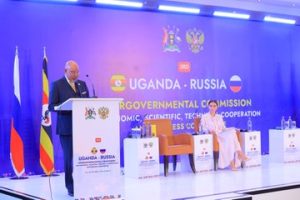
He emphasised that Uganda and Russia’s partnership—rooted in historical solidarity and mutual support in international peace and security—has evolved into a robust platform for economic and technological advancement.
“As Uganda pursues its goal of becoming a higher middle-income country, we seek Russian investment and expertise in key sectors such as oil and gas, industrialisation, agro-processing, and digital innovation,” he noted.
The Minister called upon Russian investors to leverage Uganda’s strategic position within the East African Community (EAC) and the African Continental Free Trade Area (AfCFTA) to access vast regional markets.
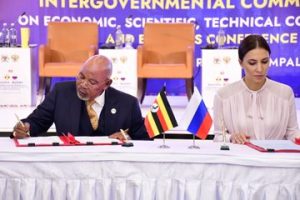
“The EAC alone offers a market of 330 million people, and the AfCFTA connects us to 1.4 billion consumers across Africa. Uganda is ready to facilitate Russian companies to thrive in this ecosystem,” Odongo added.
In her remarks, the Head of the Russian Delegation, H.E. Bella Cherkesova, lauded Uganda as a key trade and strategic partner in Africa, reaffirming Russia’s commitment to creating favourable conditions for joint investment and technological collaboration.
“I consider it symbolic that this meeting of our Commission is being held on the eve of Uganda’s Independence Day,” Cherkesova said. “Our country has made significant contributions to the independence of African states, and Uganda remains one of Russia’s most important partners on the continent.”
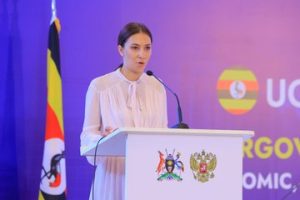
She highlighted that Russia-Uganda trade increased by 17% in 2024, with agriculture as a key area of cooperation. The two nations, she said, agreed to enhance collaboration in veterinary and phytosanitary surveillance, expanding mutual market access for agricultural products.
“We believe the agricultural industry can be a growth driver between our two nations. The Ugandan side will soon provide a list of potential exporters and importers, which we shall circulate among Russian business structures,” Cherkesova announced.
She further pointed to growing Russian interest in Uganda’s industrial and pharmaceutical sectors, noting that BIOCAD, a leading Russian biopharmaceutical firm, is increasing medicine exports to Uganda and working toward registering treatments for cancer and autoimmune diseases.
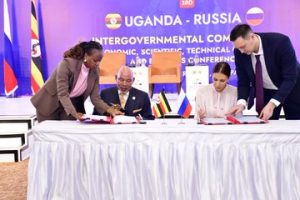
In the ICT sector, Cherkesova emphasised Russia’s readiness to support Uganda’s digital transformation and cybersecurity infrastructure.
“Our companies are ready to work with Ugandan partners on developing national cybersecurity systems, automating health and education services, and expanding e-governance,” she said. “The success of Virtus Global Security in digitalising Uganda’s transport data is a promising example.”
On education, she announced that Russia has granted 50 scholarships for Ugandan students to pursue studies in Russian universities for the 2025/26 academic year, with the potential to increase the quota based on demand. She also celebrated the success of the Open Russian Language Education and Training Centre established in Kampala in 2023.
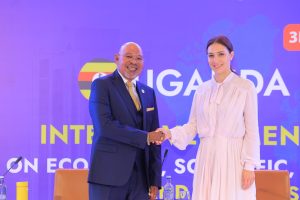
“We value Uganda’s commitment to education and human capital development. Cooperation between Makerere University and top Russian institutions such as HSE and MGIMO will further strengthen our academic exchange,” Cherkesova said.
The session also highlighted collaboration in healthcare, with Russia offering support for Uganda’s anti-epidemic programs and commending Uganda for hosting the first Russian-African Conference on Infectious Diseases in 2024.
On cultural and sports diplomacy, Cherkesova invited Uganda to participate in the 2025 International Forum “Russia – A Sports Power” in Samara and encouraged Uganda to promote its tourism potential to Russian travellers at the 2026 “Travel” International Tourism Forum.
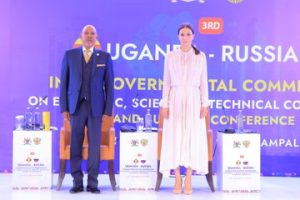
Reflecting on Russia’s technological resilience in the face of global sanctions, she underscored the importance of technological and informational sovereignty, calling for closer cooperation with Uganda in developing independent communication systems and combating misinformation.
“Sovereignty today is not only about borders—it is about owning technology, information, and production,” Cherkesova said. “We want to work with Uganda to build a safe and independent digital space for our people.”
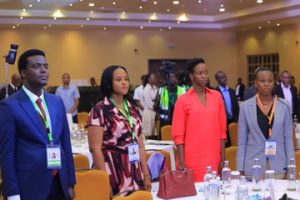
The highlight of the day was the signing of a Memorandum of Understanding between Makerere University and the Moscow-based National Research University Higher School of Economics (HSE) to strengthen academic collaboration and research exchange.
Both delegations hailed the outcomes of the IGC as a reflection of shared commitment to deepening Uganda–Russia relations and advancing mutual prosperity. The two sides agreed to intensify private-sector participation and ensure full implementation of new frameworks.
